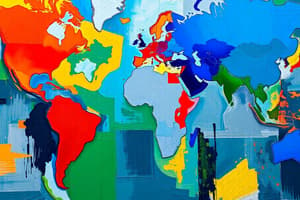Podcast
Questions and Answers
Which of the following is a theory in International Relations that emphasizes the role of social and cultural norms in shaping international relations?
Which of the following is a theory in International Relations that emphasizes the role of social and cultural norms in shaping international relations?
- Marxism
- Realism
- Constructivism (correct)
- Liberalism
What is the primary goal of global governance institutions such as the United Nations?
What is the primary goal of global governance institutions such as the United Nations?
- To protect human rights
- To promote economic growth
- To promote peace and security (correct)
- To regulate international trade
What is the primary purpose of economic sanctions?
What is the primary purpose of economic sanctions?
- To promote international cooperation
- To impose punishment on a nation
- To regulate international trade
- To deter or punish unwanted behavior (correct)
Which of the following is an example of a territorial dispute?
Which of the following is an example of a territorial dispute?
What is a primary threat to national security?
What is a primary threat to national security?
Which international organization is focused on promoting international trade?
Which international organization is focused on promoting international trade?
What is a type of economic sanction?
What is a type of economic sanction?
What is a strategy used to protect national security?
What is a strategy used to protect national security?
What is the primary focus of international relations?
What is the primary focus of international relations?
Which concept is central to the realist approach in international relations?
Which concept is central to the realist approach in international relations?
What is the term for the principle that states have supreme authority within their territorial boundaries?
What is the term for the principle that states have supreme authority within their territorial boundaries?
Which level of analysis focuses on the internal dynamics of states, including domestic politics and institutions?
Which level of analysis focuses on the internal dynamics of states, including domestic politics and institutions?
What is the term for the competition between states for influence, resources, and territory?
What is the term for the competition between states for influence, resources, and territory?
What is the primary goal of states in the pursuit of national interest?
What is the primary goal of states in the pursuit of national interest?
Which approach in international relations emphasizes the role of international institutions and cooperation?
Which approach in international relations emphasizes the role of international institutions and cooperation?
What is the term for the network of relationships between states, shaped by factors like power, geography, and ideology?
What is the term for the network of relationships between states, shaped by factors like power, geography, and ideology?
Flashcards are hidden until you start studying
Study Notes
Geopolitics
International Relations
- Study of interactions between nations, including cooperation and conflict
- Focuses on diplomacy, trade, war, and international organizations
- Theories:
- Realism: nations prioritize self-interest and security
- Liberalism: nations cooperate for mutual benefit
- Constructivism: international relations shaped by social and cultural norms
Global Governance
- System of rules, institutions, and practices that regulate international relations
- Examples:
- United Nations (UN)
- World Trade Organization (WTO)
- International Monetary Fund (IMF)
- European Union (EU)
- Goals:
- Promote peace and security
- Encourage economic cooperation
- Protect human rights and the environment
Economic Sanctions
- Measures imposed by one country or group of countries on another
- Aim to:
- Punish or deter unwanted behavior
- Influence policy decisions
- Protect national security
- Types:
- Trade sanctions (e.g., embargoes)
- Financial sanctions (e.g., asset freezes)
- Diplomatic sanctions (e.g., expulsion of diplomats)
Territorial Disputes
- Conflicts over ownership or control of territory
- Causes:
- Historical claims
- Resource competition
- Ethnic or nationalist tensions
- Examples:
- Israel-Palestine conflict
- South China Sea disputes
- Kashmir dispute between India and Pakistan
National Security
- Protection of a nation's interests, values, and way of life
- Threats:
- Military aggression
- Terrorism
- Cyber attacks
- Environmental degradation
- Strategies:
- Deterrence (e.g., nuclear deterrence)
- Defense (e.g., military alliances)
- Diplomacy (e.g., international cooperation)
Geopolitics
International Relations
- International relations involve interactions between nations, encompassing cooperation and conflict
- Diplomacy, trade, war, and international organizations are key areas of focus
- Three main theories shape international relations:
- Realism emphasizes self-interest and security
- Liberalism prioritizes mutual benefit and cooperation
- Constructivism attributes international relations to social and cultural norms
Global Governance
- Global governance refers to the system of rules, institutions, and practices regulating international relations
- The United Nations, World Trade Organization, International Monetary Fund, and European Union are prominent examples
- The primary goals of global governance are to:
- Promote peace and security
- Foster economic cooperation
- Protect human rights and the environment
Economic Sanctions
- Economic sanctions are measures imposed by one country or group of countries on another
- The objectives of economic sanctions are to:
- Punish or deter unwanted behavior
- Influence policy decisions
- Protect national security
- Three types of economic sanctions exist:
- Trade sanctions (e.g., embargoes)
- Financial sanctions (e.g., asset freezes)
- Diplomatic sanctions (e.g., expulsion of diplomats)
Territorial Disputes
- Territorial disputes arise from conflicts over ownership or control of territory
- Historical claims, resource competition, and ethnic or nationalist tensions are common causes
- Examples of territorial disputes include:
- The Israel-Palestine conflict
- South China Sea disputes
- The Kashmir dispute between India and Pakistan
National Security
- National security encompasses the protection of a nation's interests, values, and way of life
- Threats to national security include:
- Military aggression
- Terrorism
- Cyber attacks
- Environmental degradation
- Strategies to ensure national security include:
- Deterrence (e.g., nuclear deterrence)
- Defense (e.g., military alliances)
- Diplomacy (e.g., international cooperation)
International Relations in Geopolitics
Definition and Scope
- International relations involve interactions between nations, states, and governments, encompassing political, economic, cultural, and military aspects.
- The field focuses on understanding global politics and the pursuit of national interests.
Key Concepts
- State Sovereignty: States have supreme authority within their territorial boundaries.
- National Interest: The goals and objectives a state pursues to ensure its survival, security, and prosperity.
- International System: The network of relationships between states, shaped by factors like power, geography, and ideology.
- International Institutions: Organizations like the UN, EU, and WTO facilitate cooperation and regulation.
Theories and Approaches
Realism
- Focuses on the pursuit of power and security in an anarchic international system.
- Assumes states are self-interested and competitive.
- Emphasizes military power and alliances.
Liberalism
- Emphasizes cooperation, international institutions, and economic interdependence.
- Assumes states can work together to achieve common goals.
- Focuses on diplomacy, trade, and international law.
Constructivism
- Examines how international relations are shaped by norms, ideas, and identities.
- Focuses on the social construction of reality and the role of discourse.
- Highlights the importance of cultural and historical context.
Levels of Analysis
- Individual Level: Focuses on the role of leaders, decision-makers, and their personalities.
- State Level: Examines the internal dynamics of states, including domestic politics and institutions.
- International System Level: Analyzes the interactions between states and the global system as a whole.
International Relations and Geopolitics
- Geopolitical Rivalries: Competition between states for influence, resources, and territory.
- Balance of Power: The distribution of power among states, which can lead to stability or conflict.
- Regionalization: The increasing importance of regional dynamics and institutions in international relations.
- Global Governance: The development of international norms, institutions, and regulations to manage global issues.
Studying That Suits You
Use AI to generate personalized quizzes and flashcards to suit your learning preferences.




